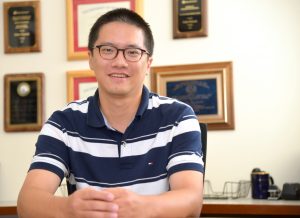Assistant Professor Tawei (David) Wang is the newest faculty member to join DePaul University’s School of Accountancy & MIS. A self-proclaimed “IT guy” and follower of interdisciplinary trends, Wang is a significant addition to the Master of Science in Audit and Advisory Services (MSAA) program, bringing a fresh skillset that combines accounting, analytics and expertise in new technologies. Wang currently teaches audit analytics and data mining courses.
“With the explosion of the amount and variety of internal and external data for organizations, it is inevitable for the accounting profession to learn how we can approach the data, process the data and make sense of it,” says Wang. “Teaching our students to be confident and capable in their data analytics skills will prepare our students to face this new dynamic environment.”
The objectives of the analytics courses at DePaul are to expose students to the concepts and basic skills in analytics in various accounting/auditing contexts, he says. Through these courses, students will be able to make strategic management decisions by analyzing explicit or implicit patterns when facing data-driven tasks.
“The exciting and challenging thing about teaching analytics in the accounting and auditing context is the lack of commonly adopted teaching materials,” says Wang. “The structure and about half of the materials are developed by faculty members in the MSAA program and often with collaboration with some of the major firms using real audit analytics cases.”
In one such collaboration, five MSAA students worked with the internal audit function at Aon for an intensive six-week audit analytics project. The collaboration provided a great opportunity for students to interact with the team at Aon and experience what it is like to work in the industry, Wang says.
“As a teacher, I love to have different types of exercises in the classroom because I believe that the best way to learn is organically or intuitively,” says Wang. “I design lectures and assignments to make students work and understand concepts first and then apply them to real-world situations.”

